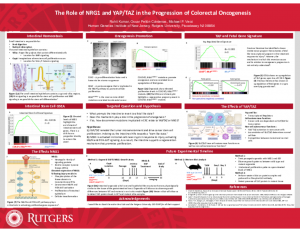Kumar, Rohit: The Role of NRG1 and YAP/TAZ in the Progression of Colorectal Oncogenesis
Listen to the audio presentation
Title: The Role of NRG1 and YAP/TAZ in the Progression of Colorectal Oncogenesis
Name: Rohit Kumar
Major: Biology
School affiliation: School of Arts and Sciences
Programs: Division of Life Sciences Summer Undergraduate Research Fellowship (DLS-SURF)
Other contributors: Oscar Pellón Cárdenas, Michael P. Verzi
Abstract: Upon complete loss of CDX2, a pro differentiation factor and tumor suppressor, in conjunction with a BRAF V600e mutation, which is the most common BRAF mutation that is implicated in colorectal cancer, there is an upregulation of fetal genes. Essentially, the loss of CDX2 in addition to a BRAF mutation results in progression of oncogenesis while simultaneously reverting the intestine to a fetal like state. While we understand that the intestine becomes more proliferative and stem-like post oncogenic mutation, the mechanism in which this reversion occurs is not clearly identified. GSEA data suggests that loss of CDX2 upregulates both YAP and intestinal stem cell genes. Based on this data, we generated two hypotheses that may address the fetal reversion in the CDX2f/f; BRAFV600E/+ mutants post oncogenic mutation. First, we hypothesized that YAP/TAZ remodel the tumor microenvironment and drive cancer stem cell proliferation. In doing so, the intestine shifts towards a “stem-like state.” We also hypothesized that NRG1 is activated in stromal cells near crypts in response to injury, activating MAPK, and PI3K-AKT signaling. As a result, the intestine supports a regeneration mechanism that promotes proliferation.
